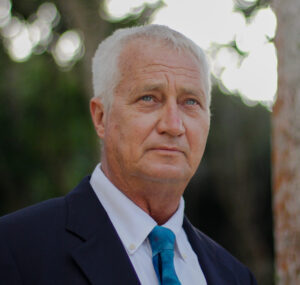After years of infighting by its leadership, the Republican Party in the Virgin Islands is mired in discord once again as 14 state committee members voted recently to oust Chairman Gordon Ackley and Executive Director Dennis Lennox over plans to hold the party caucus ahead of March 1 and to tally the results using ranked-choice voting, according to one version of events.

National Committeeman Jevon Williams said on Tuesday that the ouster “was long in the making” and that Ackley and Lennox did not consult with party leaders before adopting changes to the caucus process that flout Republican National Committee rules.
The party executives — 10 committee members in each district and three RNC members — have not had any communication with Ackley since June, Williams said, and not one of them was invited to an October fundraiser where GOP presidential candidate, Florida Gov. Ron De Santis, met virtually with members at a private St. Thomas residence.
He said the meeting held Saturday to vote on Ackley and Lennox’s ouster was properly noticed and that the party also hired a parliamentarian to ensure all rules were followed. The outcome was 14-0 in favor of new leadership, said Williams, adding that Ackley was invited but did not attend.
“If we’re in a democracy, and you’re the chairman of a party … if the majority of members demand a meeting, I think you should attend,” said Williams.
Vice Chairman Randolph Maynard is serving as acting chairman until the position is filled in a vote to be held at the party’s winter meeting, which is set for Jan. 31 to Feb. 2, said Williams.
In a statement on Monday, Ackley disputed Williams’ assertions and said he is still the party leader.

“I am and remain chairman of the Republican Party. The rules and process for the 2024 V.I. caucus were unanimously adopted on June 17, 2023, by the Executive Committee, which includes Mr. Williams and Mrs. [Antoinette] Gumbs-Hecht. Eight Republican presidential candidates filed. No objections or complaints were ever filed by anyone,” said Ackley.
“Of the actual current members of the State Committee, we believe just five or six current members, including Mr. Williams who we believe lives in Texas, gathered at an event that wasn’t a lawful and legitimate meeting of the party to rekindle the juvenile fights and petty personalities that they carried out in the now-former party for the better part of a decade. Not only do they actively oppose having a real Republican Party, but they want to prevent Virgin Islanders from having an elevated say in the 2024 campaign,” said Ackley.
“I am and remain committed to a 2024 caucus that elevates the votes and voices of Virgin Islanders, which is evident by the eight Republican presidential candidates who filed to compete. I am and remain committed to also running viable, credible candidates for senator to end the one-party rule that has failed our islands,” he said.
Ackley was referring to the fact that the U.S. Virgin Islands is led by a Democratic delegate to Congress and a Democratic governor, with 11 of the 15 Senate seats held by Democrats and zero by Republicans. Of 35,284 active registered voters in the USVI, just 1,107 are Republicans.
According to Williams, none of the party’s members favored moving the caucus to Feb. 8 or employing ranked-choice voting, both of which are against RNC rules that allow only Iowa, New Hampshire, Nevada, and South Carolina to caucus before Super Tuesday in March, he said.
“No member was for this. No member supported this,” said Williams.

At last month’s gathering with De Santis, Lennox touted the earlier caucus date — behind Iowa and New Hampshire but ahead of Super Tuesday on March 5 — as leveraging the local party’s influence since candidates would have a chance to pick up nine delegates from the USVI if they failed to gather enough support in those states.
“We might not be able to vote for president in a General Election, but our votes count equally in a primary and a caucus because a delegate is a delegate, whether it’s a delegate from Iowa or a delegate from the Virgin Islands,” said Lennox. “And the difference between Iowa and New Hampshire is, they award their delegates proportionately. So, depending on how the math works out, it’s entirely possible that the winner of the third-in-the-nation contest in the Virgin Islands actually gets more delegates than Iowa or New Hampshire,” he said.
It also boosted the party’s coffers, with eight presidential candidates each paying a $20,000 fee to qualify for the USVI ballot.
The RNC has not responded to a request for comment from the Source, but in a letter from its chief counsel to Ackley dated Oct. 19, it warned that the local party was in violation of the national rules.
“Because the caucus will be held prior to March 15, the Virgin Islands is required to allocate delegates to presidential candidates proportionally. RNC Rule No. 16(c)(2). Proportional allocation must be based on the number of votes cast in proportion to the number of votes received by each candidate. RNC Rule No. 16(c)(3). A ranked-choice voting scheme in which votes are redistributed until a candidate is awarded over fifty percent does not qualify as proportional,” Chief Counsel Matt Raymer wrote.
Raymer warned that the violations would result in a reduced number of USVI delegates at the national convention to choose a presidential candidate.
“As submitted, the Virgin Islands Rule No. 16(f) filing will result in the size of the delegation being reduced from nine delegates to four delegates and from six alternate delegates to two alternate delegates. At the national convention, the four delegate votes will be allocated in accordance with RNC Rule No. 17(b),” which governs how votes are distributed.
While the deadline for submitting a delegate plan was Oct. 1, Raymer said his office would be willing to recommend a waiver to bring the local GOP into compliance after the fact.
In his response, Ackley said the party would be willing to accept the penalties and that its ranked-choice voting plan was aligned with party rules.
“The date of the caucus has been announced and eight candidates — former President Donald J. Trump, Governor Doug Burgum, Governor Chris Christie, Governor Ron DeSantis, Ambassador Nikki Haley, Mr. Perry Johnson, Mr. Vivek Ramaswamy, and Senator Tim Scott — filed and qualified for the ballot,” Ackley wrote.
“Some candidates are already engaged in campaign activities within the Virgin Islands. For this reason, the Republican Party in the Virgin Islands is prepared to accept the penalty assessed under RNC rules, which is to reduce the delegation to no fewer than six delegates, plus the Chairman, National Committeeman, and National Committeewoman who serve as automatic delegates by virtue of their incumbency as the three Republican National Committee members from the Virgin Islands,” he said.
Regarding the vote distribution, the party is in complete compliance, said Ackley.
“The rule requires that a delegate selection process occurring prior to March 15, 2024, shall allocate delegates on a proportional basis. The Rule No. 16(f) filing submitted by the Republican Party in the Virgin Islands provides for proportional allocation of delegates based on the number of statewide votes cast,” said Ackley.
“In addition, the Republican Party in the Virgin Islands has availed itself of the provision of Rule No. 16(c)(3)(ii), which states that a state ‘may establish by statewide vote or congressional district minimum threshold of the percentage of votes received by a candidate that must be reached, above which the candidate may receive all the delegates, provided such threshold is no lower than fifty percent (50%),’” he wrote.
“Pursuant to RNC rules, the Republican Party in the Virgin Islands will use a lawful election method by which a candidate achieves that 50 percent threshold. The use of preferential or ranked-choice voting is neither unlawful nor a violation of the RNC rules. Ranked-choice voting is used across the country by state parties in primaries and party-run nomination processes to elect Republicans,” said Ackley.
Moreover, “the Republican Party in the Virgin Islands believes firmly that it must consider the reliance interests of the eight presidential candidates who have already filed to participate in the caucus on February 8, 2024. It would be fundamentally unfair and not in good faith to change the date or method of the caucus. Additionally, there are candidates for internal party offices who have taken out petitions and started the process of qualifying for the ballot,” said Ackley.
“It is our hope that Counsel’s Office will reevaluate its position regarding Rule No. 16(c)(2), and that both the Republican National Committee and the Republican Party in the Virgin Islands can focus on electing a Republican as president of the United States in 2024,” he concluded.
In a reply dated Oct. 24, Raymer disagreed.
“It is in the best interest of the Republican Party as a whole for state parties to fully comply with the RNC Rules, and we anticipate that the Executive Committee will grant a waiver only if the caucus will be held on a compliant date between March 1 and May 31 and utilize a compliant method of delegate allocation based on the votes as cast, not those reallocated under ranked-choice tabulation,” said Raymer.
He also noted that the RNC received communications from several state committee members, including Williams and Gumbs-Hecht, that the party’s submitted plan was not properly adopted and alluded to the local GOP’s history of internecine squabbles that were finally settled in July in V.I. District Court after the RNC intervened.
“This series of events is similar to 2020, when you, National Committeewoman Gumbs-Hecht, National Committeeman Williams, and others petitioned the RNC to review former Chairman John Canegata’s Rule No. 16(f) filing and eventually filed a delegate contest,” Raymer wrote.
“As such, it seems reasonable to anticipate that the Committee on Contests may be called on to weigh in again in 2024. As you may recall, in 2020, the RNC deferred to Chairman Canegata until the Committee on Contests engaged in a months-long, fact-intensive process, and the full RNC had an opportunity to consider and vote on the matter,” said Raymer.
That process saw Ackley succeed Canegata as party chairman in a caucus run by the RNC in March 2022.
In a letter to Raymer on Saturday, acting chairman Maynard informed him of the vote to oust Ackley and Lennox and his plans to bring the party back into compliance.
“Upholding the principles, values, and rules of the RNC is paramount to our commitment as a party,” Maynard wrote. “Given the urgency of this situation, we would like to inform you that we are taking swift measures to comply with RNC Rule No. 16(c(1). In no later than seven days from the date of this letter, we will convene a meeting to address the matters stipulated in the rule and ensure that the necessary actions are taken to maintain compliance.”


